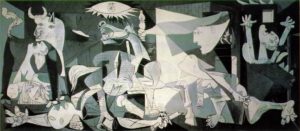Janis Brenner & Dancers premieres Once You Are Not A Stranger. Created in collaboration with Bosnian-born, electro-acoustic composer Svjetlana Bukvich, costume designer Sue Julien, lighting designer Mitchell Bogard, and installation artist Eva Petric from Slovenia, this 45-minute, interdisciplinary work investigates notions of “empathy in a multicultural, multi-ethnic, and multi-religious world and uses the dance company as a microcosm of this world.”
Video projections are embedded in the center of an elaborate set-piece, playing a personal and imagistic role in the work. Performed with live music, including Ms. Brenner on vocals.
After a meaningful tour to Sarajevo, composer Bukvich and choreographer/singer/actor Brenner spoke about collaborating. As Bukvich states:
Janis and I conversed about things that interested us and empathy came up right away, as did the need to really hear one another. I spoke about walking in someone else’s shoes – feeling wise – and how that impacts the strangeness in any relationship…Visually, the piece unfolds in wavy patterns which “freeze” on occasion, or so was our intention. There is a hanging set piece onto which video is projected in the same fashion. With each unfolding, messages becomes clearer, there is a shedding, a letting go, a cutting into deeper layers of pain and, yes, beauty and goodness which lurk in all of us. Like taming a wild animal, the piece comes to terms with its audience. The music is complex and electronic at first, then becomes gradually acoustic, with a string quartet, then a voice, a scrape of a shoe, and into silence. Art-rock-meets-electronic experimental-meets-old world sentimental.
For more information on the premiere, visit Gibney Dance.
In the mean time, watch the ETHEL String Quartet perform an arrangement of this work. The following segment was performed as part of Composers Concordance’s Roundtable concert at (le) Poisson Rouge on January 26th, 2017.
Video by Eddie Papetti
